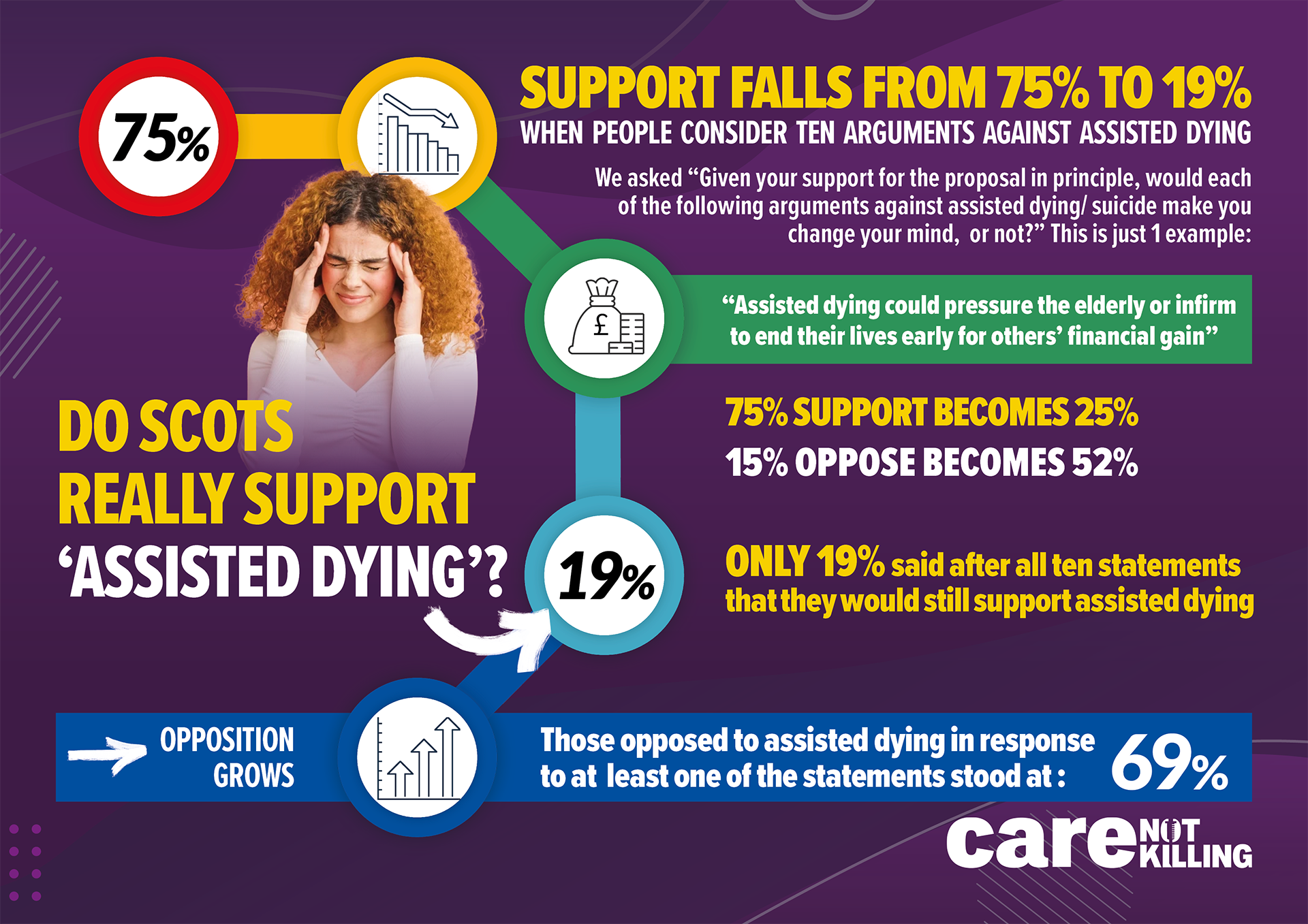Two thirds of Scots oppose assisted suicide when they consider how it operates in practice and think about the arguments against it, according to a new opinion poll.
When presented with 10 arguments against assisted dying, including facts about how it operates overseas, support for assisted suicide among the general population falls to just 19 per cent (tables attached).
Among those who initially support assisted suicide, only 25 per cent continue to do so after considering the arguments against.
And the latest survey has revealed that young people aged 18-24 are more opposed than any other age group to the legislation currently being considered by MSPs at Holyrood.
The latest research finds that support for the Members’ Bill, sponsored by Lib Dem MSP Liam McArthur, slumps when voters are presented with arguments against his Bill, when they consider the practicalities of operating assisted suicide and experience from overseas.
Voters are especially unhappy about the possibility of coercion, with pressure being put on the elderly or infirm to end their lives early for others’ financial gain. Concern about coercion results in 49 per cent of the Bill’s supporters switching to oppose it when the issue is explained to them.
There is also a huge shift in opinion when voters are told that countries which already have assisted suicide have extended the scope of the law to include children under 12-years-old.
Currently Liam McArthur’s Bill applies to children from aged 16 upwards and the Scottish Parliament’s Health, Social Care and Sport Committee in its report on the Bill, published last week, recognised that there is a possibility of the courts expanding the scope of the legislation.
With Scots Law now incorporating the UN Convention on the Rights of a Child (UNCRC) the Bill could be widened as a result of legal challenges to include children aged 12-15 and even to those aged under 12 which is the case in Belgium and the Netherlands. In Scotland, children from age 12 upwards are already allowed to make their own medical decisions without consulting their parents as a result of a previous court ruling.
In the poll, support for the Bill drops to just 19 per cent and opposition soars to 69 per cent when voters learn of the threat posed to young people. However, even excluding the issue of the law being extended to include children, support still drops to 23 per cent among all respondents and 30 percent among those who initially supported the Bill.
Dr Gordon Macdonald, CEO of Care Not Killing which is spearheading opposition to the legislation said:
“The public have genuine fears about this Bill. When presented with 10 arguments against assisted suicide full blown opposition increased from 15 per cent to 69 per cent with public support in Scotland falling from from 75 per cent to just 19 per cent. This shows that most people have no fixed views on the matter and are deeply troubled by its consequences.”
He added:
“The polling research is very clear and demonstrates great unease about the possibility of pressure being imposed on the elderly and the infirm to opt for assisted suicide because of the possibility of financial gain to family members.
“In addition, the possibility of the slippery slope and the extension of the law to include children particularly resonates with ordinary men and women in the street.”
Dr Macdonald continued:
“This puts an end to Liam McArthur’s claim that the public overwhelmingly back his Bill. Indeed a significant number of the public don’t even understand what the term assisted dying entails with supporters of the Bill most likely to be confused over what the term means.”
The polling also reveals that there remains confusion in the minds of voters of what the Scottish Bill – the Assisted Dying for Terminally Ill Adults (Scotland) Bill – would legislate for.
The poll finds 67 per cent identify assisted dying as “providing people who have less than six months to live with lethal drugs to end their life”.
However, almost one in three (29 per cent) think assisted dying is either “giving people who are dying the right to stop life-prolonging treatment” (25 per cent) or “providing hospice-type care to people who are dying” (4 per cent) which are already legal in Scotland.
Supporters of the Bill are more likely than opponents to incorrectly define assisted dying – 30 per cent of supporters are under a false impression compared to 21 per cent of opponents.
Despite that lower level of knowledge, supporters of the Bill claim to be more familiar with it than their opponents – by 49 per cent to 42 per cent.
Initial support for the Bill is highest among 45-54 year olds (83 per cent) and – interestingly – lowest among 18-24s (69 per cent), but in all categories support drops dramatically when the arguments against are considered.
Methodology Note: Whitestone surveyed 1010 Scottish adults aged 18+ from April 4-8, 2025. Data were weighted to be representative of all adults. Whitestone is a member of the British Polling Council and abides by its rules.



